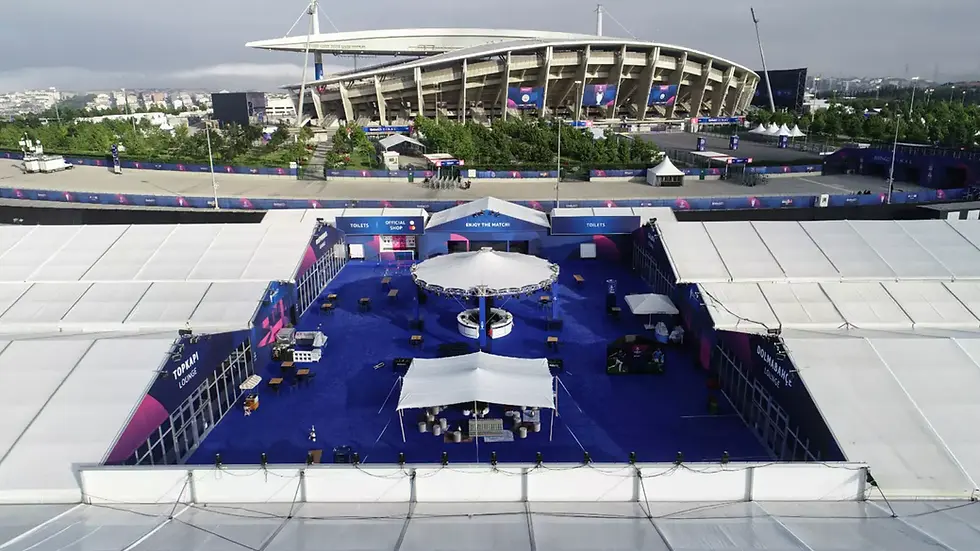Influencer Marketing Strategy Guide for Sportainment Venues
- Sportainment Consulting

- Feb 11, 2025
- 3 min read

In the dynamic landscape of digital marketing, influencer marketing has emerged as a pivotal strategy for brands aiming to enhance their reach and engagement. As we navigate through 2025, understanding and implementing an effective influencer marketing strategy is crucial for businesses striving to stay ahead.
This guide delves into the intricacies of influencer marketing, offering a detailed roadmap to craft a successful campaign for your sportainment venues.
Understanding Influencer Marketing
Influencer marketing involves collaborating with individuals who have a dedicated and engaged following on social media platforms. These influencers can sway the purchasing decisions of their audience due to their authority, knowledge, or relationship with their followers. The strategy leverages the trust that influencers have built with their audience to promote products or services authentically.
The Evolution of Influencer Marketing in 2025
The influencer marketing landscape has evolved significantly, with notable trends shaping its current state:
Rise of Micro and Nano Influencers: Brands are increasingly partnering with micro (10,000 to 100,000 followers) and nano influencers (fewer than 10,000 followers) who, despite smaller followings, boast higher engagement rates and foster strong community trust.
Integration of Artificial Intelligence (AI): AI is playing a pivotal role in identifying suitable influencers, predicting campaign outcomes, and personalizing content to target audiences effectively.
Emphasis on Authenticity: Consumers are gravitating towards genuine content. Influencers who maintain authenticity in their promotions are more likely to resonate with their audience, leading to higher engagement and trust.
Crafting an Effective Influencer Marketing Strategy
To develop a robust influencer marketing strategy, consider the following steps:
1. Define Clear Objectives
Establish what you aim to achieve with your influencer marketing campaign. Objectives may include:
Increasing brand awareness
Driving website traffic
Boosting sales or conversions
Enhancing social media engagement
2. Identify Your Target Audience
Understand who your ideal customers are by analyzing demographics, interests, and online behavior. This insight will guide you in selecting influencers whose audience aligns with your target market.
3. Select the Right Influencers
Choose influencers based on relevance, reach, and resonance:
Relevance: Ensure the influencer's content aligns with your brand values and appeals to your target audience.
Reach: Consider the number of followers and the potential to reach a broad audience.
Resonance: Evaluate the level of engagement and the strength of the influencer's connection with their audience.
4. Develop a Content Strategy
Collaborate with influencers to create compelling content that showcases your product or service authentically. The content should align with both the influencer's style and your brand messaging.
5. Set a Budget and Compensation Plan
Determine your budget for the campaign, accounting for influencer fees, content creation costs, and any additional expenses. Compensation can vary based on the influencer's reach and engagement rates.
6. Establish Campaign Guidelines
Provide influencers with clear guidelines, including:
Key messages to convey
Content formats and deliverables
Posting schedules
Disclosure requirements for sponsored content
7. Monitor and Measure Performance
Track the performance of your campaign by analyzing metrics such as:
Engagement rates (likes, comments, shares)
Reach and impressions
Website traffic and conversions
Return on investment (ROI)
Use these insights to assess the effectiveness of your strategy and make data-driven adjustments for future campaigns.
Future Trends in Influencer Marketing
Looking ahead, several trends are poised to shape the future of influencer marketing:
AI and Machine Learning: Advanced technologies will enhance the precision of influencer selection and campaign personalization.
Live Shopping and Social Commerce: Real-time product promotions through live streams are expected to become more prevalent, offering interactive shopping experiences.
Virtual Influencers and the Metaverse: The emergence of digital influencers and virtual environments will open new avenues for brand collaborations.
Conclusion
Influencer marketing in 2025 demands a strategic approach that prioritizes authenticity, leverages technological advancements, and adapts to evolving consumer behaviors. By meticulously planning and executing your influencer campaigns, your brand can achieve significant growth and a competitive edge in the digital marketplace.
Need a marketing strategy for your golf course, surf park, or sportainment venue? Contact us today!
.png)

